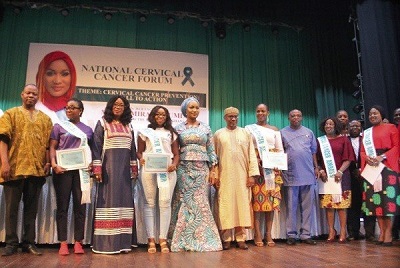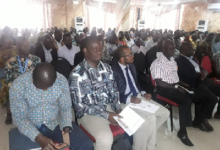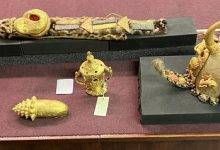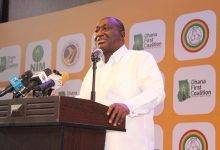
The Second Lady, Mrs Samira Bawumia, has launched a national cervical cancer campaign with the commissioning of ‘Cervical Cancer Ambassadors’ to create awareness on the deadly disease.
The ambassadors made up of journalists selected from various media houses have a mission to drive home the message of preventing cervical cancer.
The ambassadors will also sustain the fight of creating public awareness of cervical cancer beyond January 2020.
The campaign is organised by the Society of Obstetricians and Gynaecologists of Ghana (SOGOG) in collaboration with Samira Empowerment Humanitarian (SEHP) and other stakeholders.
It is on the theme: “Cervical cancer prevention: A call to action.”
The human papilloma virus (HPV) which causes cervical cancer is acquired through skin to skin contact with someone who has the virus during sexual intercourse.
Once infected, the virus could stay in the host for about 10 to 15 years before symptoms start to show.
Symptoms of the disease include offensive discharge from the vagina, blood flow after normal menstrual period, during or after sexual intercourse and women in their menopausal age who bleed, prolonged back pains, loss of weight among others.
Cervical cancer is the second most frequent occurring cancer in women after breast cancer and common cause of cancer related deaths among women in developing countries.
Current estimates in Ghana indicates that every year 3,151 women are diagnosed with cervical cancer and 2, 119 die from the disease.
It is common in women and girls who are sexually active.
Deaths due to cervical cancer are projected to rise by almost 25 per cent over the next 10 years hence the need for the campaign to allow for more screening.
The Second Lady, also the patron of cervical cancer prevention commended SOGOG for the campaign and asked that men also be screened.
She said cervical cancer is a public health issue and therefore requires a national response.
“No woman should die of cervical cancer because the disease is preventable,” she added.
The Second Lady expressed gratitude to stakeholders especially Marie Stopes for the support they are rendering to women and girls in that regard.
The Deputy Minister of Health, Mr Justice Abban, urged health professionals to find ways of ensuring that cervical cancer screening is made free.
Cervical cancer screening on a normal day goes for GH150.00 but has been reduced to GH 80.00 due to the campaign to have more women screened.
The HPV vaccination, which goes for GH 300 has also been reduced to GH200 to allow more women go for vaccination for preventive measures.
He called on the Public Health team of the Korle-Bu Teaching Hospital to sustain the momentum of the awareness creation to have an all year round campaign with tangible results.
Dr Ali Samba, the President of SOGOG, commended the efforts of non- governmental organisations and the media for creating public awareness on cervical cancer.
He said a lot of efforts and resources have gone into reducing mortality from pregnancy related complications which is commendable but not same for cancer of the cervix.
Dr Samba noted that the need for central coordination in the fight against cervical cancer has become necessary.
Implementation has become one of the challenges and therefore SOGOG is in partnership with state agencies to implement strategies and recommendations to ensure women with cervical cancer are well taken of, he said.
“The talking have gone on for far too long and the need to come together to take actionable steps to help these poor and vulnerable women,” he added.
Dr Edward T Dassah, a lecturer at the School of Public Health, Kwame Nkrumah University of Science and Technology (KNUST), called for an increase in cervical cancer screening to allow early detection.
He called for an organised screening programme rather than the opportunistic or the sporadic ones.
This, he said would help in achieving the target population.
Stakeholders in their solidarity messages pledged their support in the campaign on cervical cancer.
GNA







